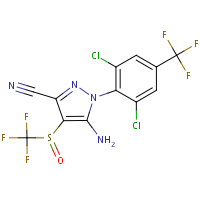
It’s party time for bees and other species, because, starting today, the chemical
pesticide fipronil can’t be used anymore in agriculture across Europe.
Fipronil is a common pesticide used in agriculture and sparked an international food scandal
last summer because the toxic substance was used illegally in chicken stables, contaminating
eggs and eggs derivatives. So far, 26 European countries and 23 non-EU countries — in total
49 countries — have been affected. The extent of the contamination shows how our food
and agriculture system is broken. It’s time to leave toxic substances behind and rethink the
food we eat and produce.

During the night of 15th to 16th of September a giant bee was presented on the facade of the
Palace of Culture and Science in Warsaw to bring attention to problems related to bee
population in Poland and to encourage people to take action by participating in the
“Adopt a bee” campaign. © Bogusz Bilewski / Greenpeace
However, improper and illegal use of fipronil is not the only concern. Fipronil is also notorious
because it’s harmful to bees and other pollinators. In the past, it was widely used on crops to
protect crops against pests. Low doses of fipronil were applied to the seeds before sowing. The
end result was the intoxication of the bees harvesting on the nectar and pollen of those fields
treated with the toxic chemical.
Fipronil used on crops posed an unacceptable risk to bees and Greenpeace has been actively
pushing for a phase-out of fipronil as part of its “Save the bees” campaign. In 2013 the
European Commission strongly restricted the use of fipronil in agriculture.

Greenpeace activists dressed like working-bees on “strike”, protest in front of the
Agriculture Ministry, asking for a total ban of neonicotinoid pesticides. © Francesco
Alesi / Greenpeace
Fipronil use has been gradually reduced since then, and more and more EU countries
stopped using it. From today onwards the use of fipronil on crops is forbidden in the
entire EU. This is great news for bees, bumblebees, butterflies and many other insects.
However, other harmful pesticides are still on the market, threatening bees and other
species. Neonicotinoids, which were also partially restricted in 2013, are now in the eye
of the storm as mounting scientific evidence shows their toxic effects on bees and other
species.
Recent data has shown that neonicotinoids are dangerous in fields, not only when
tested in laboratories. Last March the European Commission put forward a proposal
to further restrict clothianidin, imidacloprid and thiamethoxam, the three most known
neonicotinoides. However, no decision or action to ban them has been taken despite
the evidence of their hazardous effects indicates that they should also go.
Tackling individual substances is a short term solution, however it doesn’t address the
heart of the matter: industrial agriculture is not viable as it poses too many risks for our
planet. A different agricultural model must be adopted globally and urgently. Ecological
farming can help us face big challenges such as climate change, biodiversity loss
or water pollution. It also provides healthy sustainable food for everybody.

Wheat grown at GAEC (Groupement Agricole d’Exploitation en Commun)
Les Sources de l’Yon, an ecological farming group. © Elsa Palito / Greenpeace
With the reform of the Common Agricultural Policy to be debated soon in the EU,
we will have a chance to discuss how to promote ecological farming and avoid further
food scandals and to stop the decline of bees and other species.
In the meantime, here’s 12 things you can do to start an eco-food revolution.
Luís Ferreirim is a Food for Life campaigner with Greenpeace Spain
*Original article online at https://www.greenpeace.org/international/story/7546/great-news-for-bees-time-to-say-goodbye-to-fipronil-sosbees/
